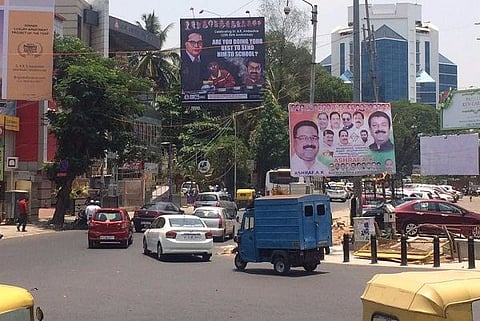

For most Bengalureans, the innumerable advertisements and hoardings that dot the city were just an eyesore. The investigations of a KAS officer however, showed up the eyesore ads to be part of a scam that runs up to Rs 2,000 crore.
As far as scams go, the ad scam, as it is now called, is one of the largest in terms of the money involved. By turning a blind eye to hoardings which are illegal, BBMP officials simply allowed offenders to go scot free and avoid coughing up the penalties, allegedly because they were bribed to do so.
When was the ad scam unearthed?
The scam was unearthed in 2015 with the Assistant Commissioner (Advertisements), KAS officer K Mathai submitted a total of eight reports blowing the lid on it and pegging revenue losses to the BBMP at Rs 2,000 crore over a period of seven years.
How do ads and banners become illegal?
Recently, the BBMP said Bengaluru had over 6000 hoardings of which more than 4,000 were illegal. There are several ways in which advertisements and banners become illegal.
Ban on ads: The BBMP has also stopped issuing fresh permissions for over 6-7 years, which is why many advertisers may have resorted to putting up multiple hoardings under a single permit, thus violating the rules.
Lack of records: Also, another lapse on part of BBMP is that they have failed to maintain records of the various categories under which banners can be constructed. The hoardings can be broadly classified under three categories, based on their size- 24x12 metres, 30x15 metres and 40x20 metres. Taking advantage of the lack of records, advertisers have also resorted to putting up hoardings that are larger than the permissible limit.
Loopholes in the law: Permissions for hoardings that are not processed within 45 days, are deemed to be permitted. According to the report, BBMP simply never collected fines from the backers of any of these hoardings even though it claimed that such material was illegal.
Penalizing violations: There is no single authority that is entrusted with taking action against the violators. The zonal commissioners at the Head office of the Advertisment department are vested with the authority to take action. These commissioners in turn have assigned Additional Revenue Inspectors (ARIs) at the zonal office to keep a check on illegal hoardings and banners. However, the ARIs have not been able to complete their task properly, leading to a lag in keeping the hoardings in check.
Apathetic legal team: Mathai’s report highlights that the BBMP’s failed in grasping the legalities surrounding public advertising and recovering Rs 2,000 crore. While the civic body expected to gain this revenue by charging agencies for advertising on government properties, the advertisement bye-laws formulated in 2006 state that fines can be levied only over past three years. Thus, the figure dropped from a whopping Rs 2,000 crore to a meager Rs 17.83 crore. Also, numerous cases against advertisers have been stayed by the courts and the BBMP’s legal department failed to get them vacated.
Action taken?
In July 2015, BBMP Commissioner TM Vijay Bhaskar had said that the BBMP saw no reason to order an investigation into the allegations raised by Mathai.
However, earlier this month, based on Mathai’s report and complaints filed by assistant revenue officers, 20 advertisers were booked for illegal advertising by the Bengaluru Metropolitan Task force (BMTF).
On Tuesday, Mathai was transferred to the Department of Personnel and Administrative reforms. This move comes in light of a report submitted by BBMP Commissioner G. Naik, alleging that his behavior and actions were contrary to service rules. Mathai had submitted his eighth report on the alleged scam when he was promoted to the post of Deputy Commissioner (Markets). Also, apart from conducting his research independently without instructions from any higher council to do so, he shared his findings with the media directly, Naik’s report said.